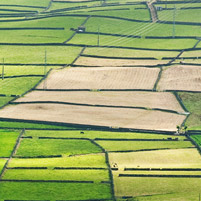Defining a Nation's Energy Strategy

Will you fly or drive to your vacation destination? Choose the fresh fruit or the canned? Buy the house near the nuclear plant?
Getting to the bottom of how these questions are answered is Carnegie Mellon Professor Baruch Fischhoff's passion. An expert on risk analysis and communication, Fischhoff and his teaching had a powerful impact on Kristen Schell (CMU'07), who is now a researcher in Portugal, modeling the energy network for the Azores Islands.
Her work, which promotes renewable energy and climate change mitigation, will help decision-makers better evaluate what their real policy goals are as they define an energy strategy for the island nation.
"Baruch's research in risk analysis and decision-making has applications in many fields, including work with Homeland Security, the FDA and the National Institute for Health. But during my time with him in Engineering and Public Policy (EPP), we used his expertise to analyze why some communities were so opposed to having liquified natural gas terminals in their towns and why some were not," said Schell, who majored in both chemical engineering and EPP.
One community was overly concerned with the risk of a terrorist attack on the terminal and catastrophic explosion. The other community had no such concerns whatsoever.
"We were trying to uncover the decision-making processes within the communities that were the root causes for such vastly different risk rankings," she said.
Now, Schell applies her education to help decision-makers, who are often government officials, better evaluate their real policy goals. Schell says this type of research has been used to help clarify goals for water resource planning and even in the planning of the nuclear waste repository in Yucca Mountain.
"Baruch's passion for his field and continuous support make him both a great professor and a great mentor," Schell said. "As an engineer, I really appreciated the behavioral and decision science perspective he put on the topic."
Schell is motivated by the fact that her work will have a real-world impact in promoting renewable energy and climate change mitigation, and hopefully serve as a case study for other island nations.
"Having previously worked in technology policy, I found that too often not all viable policy alternatives were explored, usually for a lack of understanding of the potential benefits of the work," Schell said. "I hope to encourage studies that explore decision-making from a structured perspective, so that no viable option is left unexamined."
Related Links: Engineering & Public Policy | Chemical Engineering | Social & Decision Sciences | Environment at Carnegie Mellon
